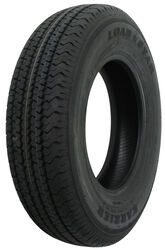
Are New Wheels Needed if Upgrading From Load Range C to Load Range D Trailer Tires
Question:
I have a 2014 KZ Sportsmen 16BH Single Axle Travel Trailer. UVW is 2,263 lbs and GVWR is 2,800 lbs. After experiencing a tire blowout, I recently replaced the factory installed ST 175/80R13 tires with new Goodyear Marathon ST 175/80R13 Load Range C . Unfortunately I experienced another blowout on the new tires after only a few hundred miles. I am confident the trailer was not overloaded, tire pressure was maintained at 50psi as recommended, and I was traveling at the maximum recommended speed of 65MPH. I am concerned that the limit of Load Range C tires 2 X 1,630 = 2,720 lbs is just under the GVWR of 2,800 lbs. I also suspect one side of the trailer is slightly heavier than the other because the A/C, refrigerator, inverter and storage tanks are all on one side of the trailer - this side that experienced both blowouts. I am considering new tires with a Load Range of D specifically, Item # AM10210 - Karrier ST175/80R13 Radial Trailer Tire. Will I need new wheels/rims if I upgrade to a Load Range D tire?
asked by: Rich K
Helpful Expert Reply:
You can absolutely upgrade to the Karrier ST175/80R13 Radial Trailer Tire - Load Range D # AM10210 tires without needing new wheels and rims. These tires have a maximum capacity of 1,610 lbs at 65 psi so a pair of these will have a 3,220 lb capacity.
It seems likely that you have figured out the reason why you are experiencing blowouts because if one side of your trailer is significantly heavier than the other, that tire is going to build up excessive heat, which is what causes blowouts. If at all possible try and even distribute the weight in the trailer though I realize this might be difficult considering you have so much heavy cargo on one side.
I have added a link to a video review of these tires for you to take a look at as well.

Product Page this Question was Asked From
Karrier ST175/80R13 Radial Trailer Tire - Load Range D
- Trailer Tires and Wheels
- Tire Only
- Radial Tire
- Load Range D
- 175/80-13
- 13 Inch
- M - 81 mph
- Kenda
more information >
Featured Help Information
Miscellaneous Media

Continue Researching
- Q&A: Correct 13" Wheel to Install the Americana Baby Moon Trailer Wheel Center Cap
- Q&A: What is the Difference Between Load Range C and D ST175/80D13 Trailer Tires
- Article: Trailer Tire Sizing
- Q&A: Choosing Between Kenda Karrier and Kenda Loadstar ST175/80-13 Tire
- Article: 7 Common Questions Everyone Has About Trailer Tires
- Article: How to Measure the Bolt Pattern of a Trailer Wheel
- Q&A: Upgrading from ST175/80R13 Load Range C to Load Range D Tires on EZ Loader Boat Trailer
- Q&A: Comparing 175/80-13 And 185/80-13 Tires
- Q&A: What is the Difference Between Load Range B and C Trailer Tires
- Q&A: Should Wheels be Replaced with the Tires on a 10 Year Old Coleman Pop Up Camper
- Article: Trailer Wiring Diagrams
- Article: Measuring a Trailer Tire
- Article: Brake Controller 7- and 4-Way Installation Kit (ETBC7)
- Article: Ram Trailer Tow Prep Package








